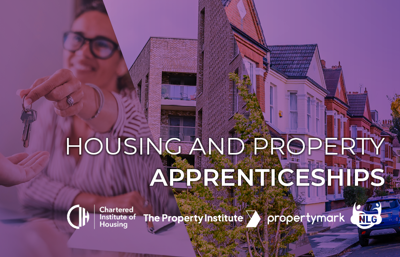Course overview
This housing and property apprenticeship will help you progress in your career in the housing and property sector. It prepares you for a range of housing and property management duties and sets you up for more specialist roles in the future. You will learn about the legislation and regulation that housing professionals need to know, the diverse types of housing services, and important issues in the housing market. You will also learn how to develop your knowledge of legislation, the history of housing, repairs and maintenance and organisational policies within the housing sector.
Course content
- Organisation background
- Organisational policies
- Project planning
- Legislation and regulation 1 – Types of law
- Customers
- Project report writing
- Legislation and regulation 2 – Occupancy, tenure, and lettings law
- Professional development
- Legislation and regulation 3 – Housing law
- The history of housing
- Assets, repairs, and maintenance
- End point assessment support
The learner journey
1. 15 months on-programme – This is when you will gain the skills, knowledge and behaviours which will then support you in the End-Point Assessment. Your apprenticeship will include either remote or classroom-based sessions each month, along with assessments and wider learning that could include workplace training, e-learning, research, and completion of assignments. You will build a portfolio of evidence of your knowledge, skills, and behaviours before completing a work-based project.
You will be required to spend at least six hours a week on off-the-job training in order to meet the course requirements.
2. Gateway – After 15 months teaching and learning, the employer, training provider and the learner will review the learner journey and decide whether it is the right time for the end point assessment to be arranged.
3. End-Point Assessment – This is when you will need to demonstrate you have learnt the required knowledge, and behaviours, through a remote end point assessment interview and submission of your work-based project. The project makes up 80% of the grade and the interview makes up 20%. You will also be required to deliver a 10-minute presentation during your end point assessment interview.
Industry recognised qualifications
Apprentices have the opportunity to study an industry recognised qualification alongside their apprenticeship. Options include the Chartered Institute of Housing Level 3 Certificate in Housing Practice and The Property Institute Level 3 Course in Leasehold Property Management for Apprentices. During their qualification, apprentices receive student membership, granting access to resources, webinars, and industry events.
Employer benefits
- Opportunity to build a team qualified to upcoming ROPA and social housing recommended standards
- Completion of a high-level project that benefits the company
- Free apprentice recruitment service
- Workforce training planning
- Cost effective training
- Increase productivity and revitalise your company
- Skilled workforce - improve your service
- Reduce staff turnover
- Raise staff morale
Eligibility
Those with an annual wage bill of less than £3m do not pay the Apprenticeship Levy. Instead, 95% of each apprenticeship is funded by the government whilst a 5% investment is required by the employer to enhance the skills of their employee.
- Employers are also be eligible for a £1000 incentive payment if the apprentice is aged 16–18.
- Employers with less than 50 employees and where the apprentice is aged 16–18, the government will fund 100% of the apprentice and are eligible for a £1000 incentive payment.
- Employers with those aged 19+ the government will continue to fund 95% of the apprenticeship programme whilst a 5% investment is required by the employer.
Businesses can manage this through the Apprenticeship Service online account.
Find out more
To learn additional information about this apprenticeship, you can explore our Course Sheet or Learner Journey and Learner Journey (CIH route).




